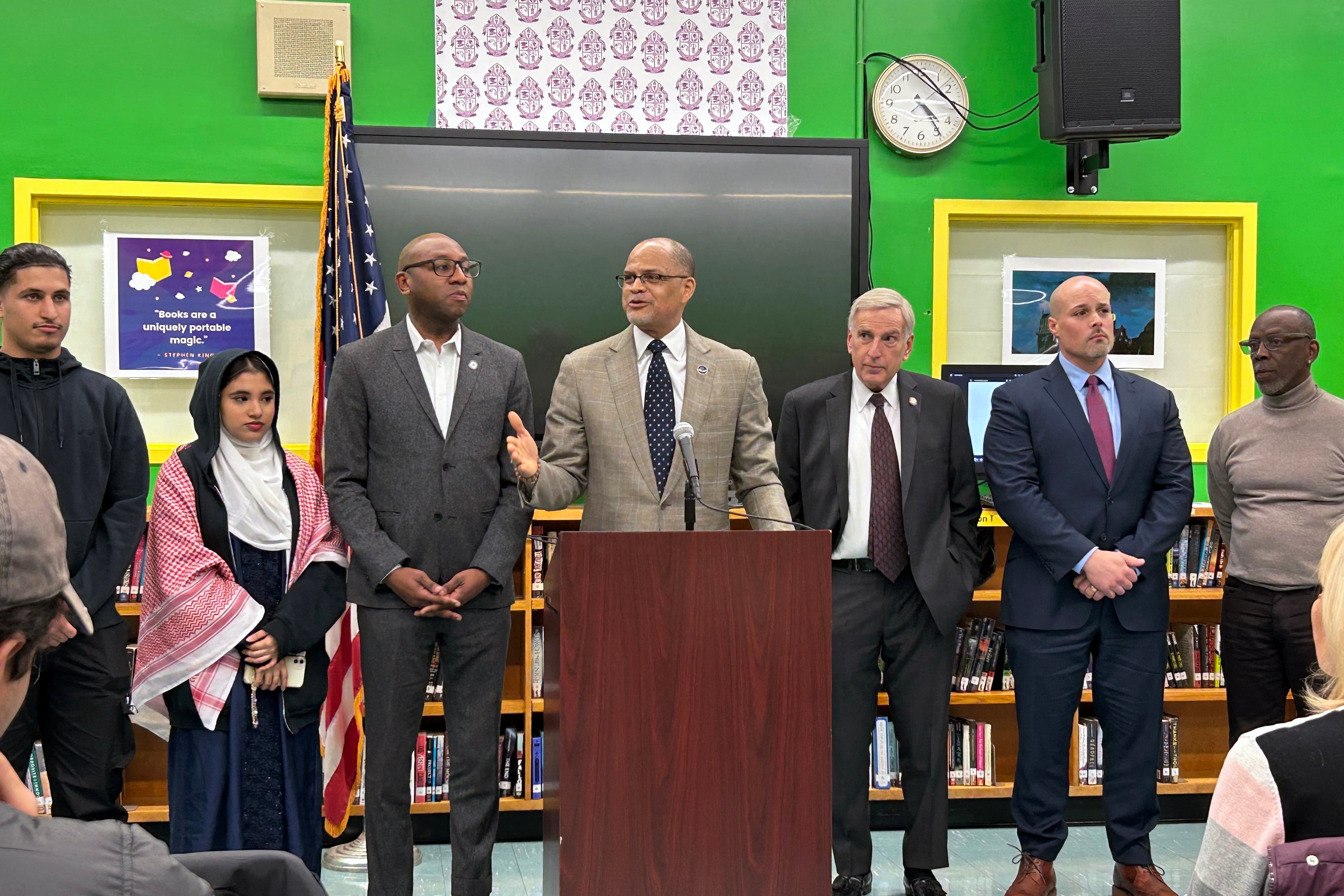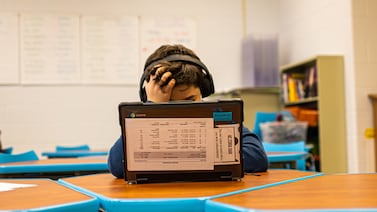Sign up for Chalkbeat New York’s free daily newsletter to keep up with NYC’s public schools.
A teacher who faced raucous protests over her public support for Israel filed a lawsuit last week, claiming city officials failed to protect her before students began marching through her Queens school calling for her ouster.
Despite the suit, Karen Marder, the teacher targeted in the protest, told Chalkbeat that she is committed to staying at Hillcrest High School. This year, she became one of the school’s deans and helps oversee student discipline.
“Hillcrest is my home,” she said. “It never really was a question for me about coming back.”
It has been a tumultuous year for Hillcrest, which garnered national attention as public schools and universities have struggled to address fallout from the Israel-Hamas war. The episode was a flashpoint during a congressional hearing where schools Chancellor David Banks was grilled on New York City’s response to antisemitism.
On Nov. 20, students flooded the hallways between classes in protest of a photo Marder posted of herself on Facebook holding a sign that read “I Stand With Israel.” The image of Marder, who is Jewish, was from a rally she attended two days after Hamas attacked Israel on Oct. 7.
In response, “hundreds of students congregated outside her classroom and throughout the school, chanting threats and demanding her termination,” contends Marder’s lawsuit, which was filed in state court in Queens. Video posted on social media showed students dancing in the hallways and a water fountain ripped from the wall. At the time, Marder was locked in an assistant principal’s office on a different floor watching the events unfold on a monitor.
Marder said she notified Hillcrest administrators on Nov. 19, a Sunday, that students were planning to protest the next day. But her lawsuit contends that “no concrete measures were taken to protect” her. Although the suit acknowledges that school officials filed a report, and police officials came to interview her, they “were not present to take action on [Marder’s] behalf.”
The lawsuit asserts that school officials had no plans to keep Marder out of the classroom that day, and it was coincidental that police officials happened to be interviewing her when the protests started, keeping her out of the fray.
Later that evening, students posted Marder’s home address and family members’ names online, the lawsuit alleges. The following day, Marder said, the school’s principal told her to stay home from work and use sick time. “I had to fight with them over that,” she said. “I wasn’t sick, I was in danger.” (She was later placed on a different form of leave, according to the suit.)
The entire episode caused her “severe psychological and emotional trauma,” according to the complaint, which seeks unspecified monetary damages.
A spokesperson for the city’s law department said they will review the case and an Education Department spokesperson did not comment. Banks previously said that Marder was “never in direct danger.”
During his congressional testimony in May, Banks, who is a Hillcrest alum, said that the leaders of the protest “engaged, clearly, in an act of antisemitism” and “a number” of the students responsible for organizing it were suspended. The city removed the school’s principal and assigned him to a central office job, Banks said.
But in the immediate aftermath of the episode in November, Banks struck a more even tone — rebuking students whom he said behaved inappropriately but expressing understanding for their strong reactions. Roughly 30% of students at Hillcrest are Muslim.
“They consume their information through social media,” Banks said. “And what they are seeing on a daily basis are children and young people in Palestine … being blown up.”
Marder was given the opportunity to transfer to a different school in the aftermath of the November protest. In an April USA Today essay co-authored with Randi Weingarten, president of the American Federation of Teachers, Marder argued she planned to stay — “to connect, to listen, learn, debunk misinformation and combat intolerance.”
Hillcrest teacher becomes a dean
Marder told Chalkbeat things have been relatively calm this year so far, which she credits in part to the school’s new principal. Under the previous leadership, problems with campus climate had reached a boiling point well before the November protest, she said.
This year, she is teaching just one health class and has taken on a new role as a dean, overseeing discipline issues and restorative justice programs that seek to mediate conflicts instead of resorting to suspensions.
“Not one student has said anything about what happened last year,” she said.
City officials have launched some training efforts to help schools have difficult conversations around the Israel-Hamas war and have promised to unveil new curriculum materials that include the experiences of Jewish and Muslim communities. Some of those are not slated to be released until the end of the school year.
Marder said there have only been superficial conversations at Hillcrest to help the community process the conflict in the Middle East as well as the turmoil at the school last year.
“I’m willing to do the work with the students and staff about the issues that took place,” she said. “That doesn’t mean I’m letting the DOE off the hook.”
Alex Zimmerman is a reporter for Chalkbeat New York, covering NYC public schools. Contact Alex at azimmerman@chalkbeat.org.







